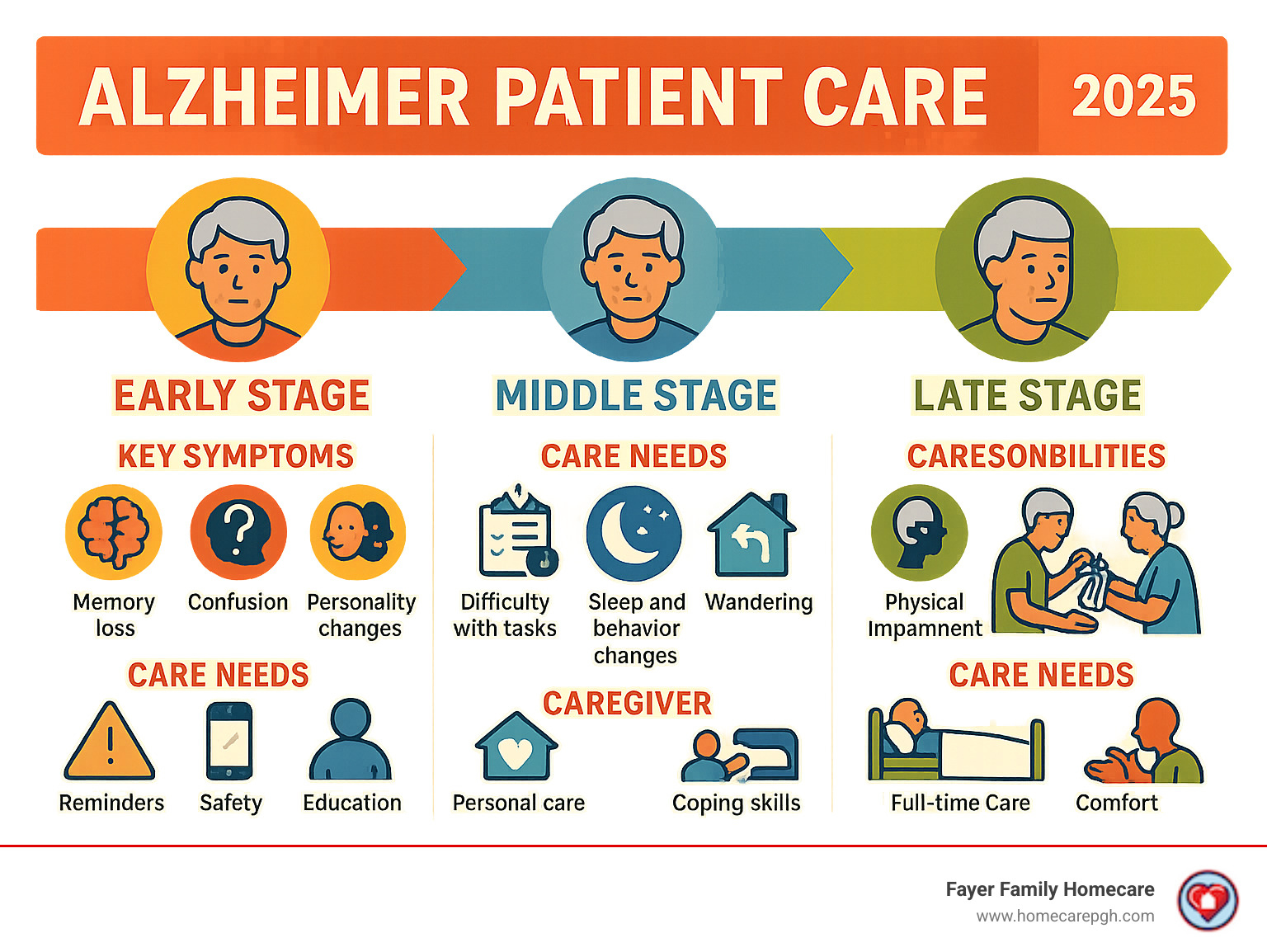
January 15, 2026
Beyond the Couch: 19 Engaging Home Activities for Dementia PatientsDiscover 19 engaging Alzheimer's activities at home to boost mood, reduce agitation, and foster connection. Find joy and purpose.
Read Article
Alzheimer patient care is a complex journey, touching everything from daily safety to managing progressive cognitive changes. With millions caring for loved ones with Alzheimer's or related dementias, understanding the full scope of caregiving is essential for both patient and caregiver well-being.
Key components of effective Alzheimer patient care include:
Alzheimer's disease progressively impairs memory and cognitive functions, making it the most common form of dementia. The disease affects 60-80% of all patients diagnosed with dementia, creating unique challenges that require specialized approaches.
Changes in eating habits and incontinence are common, especially in later stages. This highlights the need for comprehensive care planning to manage symptoms and preserve dignity and quality of life.
Understanding the full landscape of Alzheimer's care helps you make informed decisions, whether you're just noticing changes or are deep into the caregiving journey.

The Alzheimer patient care journey starts with subtle changes, often mistaken for normal aging. Recognizing these early signs is crucial for timely planning as future care needs evolve.
A common early sign is persistent memory loss that disrupts daily life, going beyond occasional forgetfulness. This includes forgetting recent information, important dates, or asking the same questions repeatedly.
Other subtle signs include:
It's vital to distinguish these from typical age-related changes. For instance, occasional trouble finding a word is normal; frequently struggling with vocabulary is a potential sign.
If you observe these signs, seeking a professional diagnosis is the next critical step. Early diagnosis allows more time to plan and access resources. To learn more, you can review information on Understanding the Difference Between Alzheimer's & Dementia. For a comprehensive look at symptoms, see More on Alzheimer's symptoms.
Planning for future care is a significant, emotional task involving practical and legal steps. As the disease progresses, care needs increase, potentially requiring full-time support.
Important steps in future planning include:
Balancing the patient's needs with your own well-being is paramount. It's essential to seek support. If you're looking for professional help, we have resources on How to Find Reliable Alzheimer's Care Near You to guide your search.
For a person with Alzheimer's, a safe, familiar home is a sanctuary. As cognitive abilities decline, the home can become confusing or dangerous. Creating structure with daily routines and safety modifications is a cornerstone of effective Alzheimer patient care.
At Fayer Family Homecare, we've seen how the right home environment can improve safety and peace of mind for everyone involved.
As memory and judgment decline, everyday objects can become hazards. Simple safety modifications can create a protective environment without major renovations.
Prioritize fall prevention. Secure loose rugs, use non-slip mats in bathrooms, and install grab bars in showers and near toilets. Ensure stairways have sturdy handrails and consider adding bright tape to stair edges for visibility.
Next, secure hazardous items. Use child-proof locks on cabinets with cleaning supplies, medications, or sharp objects. These simple measures prevent accidents caused by confusion.
Good lighting reduces confusion and fall risk, especially in hallways, stairs, and bathrooms. Add nightlights for safe navigation after dark.
Reduce clutter to create clear pathways and prevent trips. Avoid rearranging furniture to maintain a comforting, familiar layout.
Finally, create a calm atmosphere by minimizing noise and visually confusing patterns. Personalize the space with familiar photos and objects to provide emotional comfort.
Our experienced caregivers understand how to spot potential safety concerns, helping create a protective environment while preserving the warmth of home.
For someone with Alzheimer's, consistency is a lifeline. A structured daily routine provides predictability, which reduces anxiety and confusion.
While consistency is important, remain flexible for appointments or other disruptions. Introduce changes gently and communicate simply.
Meaningful activities custom to current abilities provide stimulation and a sense of purpose. The key is to match the activity to their present capabilities.
Our caregivers at Fayer Family Homecare specialize in creating engaging recreational activities customized to each person. For more ideas, explore our guide on Dementia Activities at Home.
Good nutrition is crucial but becomes challenging as Alzheimer's progresses. People may lose interest in food, forget to eat, or struggle with eating.
Our Personal Care Services include assistance with meal preparation and eating support. We understand these daily challenges and bring expertise and compassion. For more on Alzheimer's Care at Home and Diet and Alzheimer's prevention research, these resources can guide you.
Alzheimer patient care brings challenges like communication difficulties and behavioral changes that can feel overwhelming. However, these are manageable with the right understanding and strategies. These changes are symptoms of the disease, not personal attacks. Approaching them with patience allows you to connect and provide comfort.
As Alzheimer's progresses, communication becomes difficult. This doesn't mean the connection is lost; it just requires a different approach.
Our caregivers at Fayer Family Homecare understand that communication goes beyond words. This compassionate approach is central to our Dementia Companionship Care.
Behavioral changes like anxiety, agitation, or wandering are often a way of communicating an unmet need or discomfort.
Our experienced caregivers know how to respond to these changes with patience and understanding. For additional guidance, you'll find helpful resources in these Tips for caregivers from Alzheimers.gov.
You don't have to steer these challenges alone. Professional support can make this journey more manageable.
Caring for someone with Alzheimer's is a demanding journey. Feelings of exhaustion, frustration, and guilt are common. Recognizing caregiver stress and burnout is the first step to getting support. Self-care isn't selfish; it's essential. You can't provide quality Alzheimer patient care if you're running on empty. Remember the oxygen mask rule: put yours on first.
You don't have to do this alone. A network of support is available, and reaching out is a sign of strength.
Resources like the Eldercare Locator and the Family Caregiver Alliance can connect you to local services. Asking for help is smart self-care.
Your physical and mental health directly impact the quality of care you provide. Being well-rested, nourished, and emotionally balanced makes you a more patient and effective caregiver.
If you feel persistently overwhelmed, anxious, or depressed, seeking help from a mental health professional is a sign of strength. Many therapists specialize in caregiver support. You can find resources at the National Institute of Mental Health.
Your role is invaluable, and your well-being matters. We understand this at Fayer Family Homecare, which is why we emphasize The Essential Role of Caregivers in Home Health Care and offer services to support the entire family.
Caring for someone with Alzheimer's is a challenging yet meaningful journey. It tests our patience and teaches us about human connection, offering moments of joy and satisfaction.
Alzheimer patient care touches every part of daily life, from noticing early signs to creating safe home environments and adapting communication. Each step requires practical knowledge and emotional strength.
A supportive environment—with safe spaces, comforting routines, and joyful activities—is vital for preserving dignity. It's also crucial to remember that challenging behaviors are symptoms of the disease, not reflections of your loved one.
Most importantly, you, the caregiver, matter. Your well-being is essential. Seeking support from family, friends, support groups, and professional services is a smart way to sustain your ability to provide compassionate care.
At Fayer Family Homecare, we've walked this path with countless families in the Greater Pittsburgh Area. Our experienced home caregivers understand the unique challenges of Alzheimer patient care, providing supervision, companionship, and genuine connection. We are here to support both you and your loved one.
You are not alone. With the right knowledge and support, you can face these challenges with strength and hope. When tasks become overwhelming, our team is ready to help, including support with maintaining a comfortable home environment through our housekeeping services.
This journey may not be the one you planned, but it's one where love, patience, and professional support can make all the difference.
